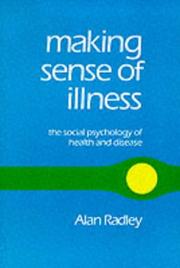| Listing 1 - 10 of 23 | << page >> |
Sort by
|
Multi
ISBN: 9090178392 9789090178394 Year: 2004 Publisher: Genk Kris Constantinus Paul Vissers
Abstract | Keywords | Export | Availability | Bookmark
 Loading...
Loading...Choose an application
- Reference Manager
- EndNote
- RefWorks (Direct export to RefWorks)
Medische psychologie --- gezondheidspsychologie --- gezondheidspsychologie. --- Anesthesiology --- Physiology of nerves and sense organs --- Mammals --- Gezondheidspsychologie. --- Proefschriften --- Thèses --- Theses
Book
ISBN: 9031332097 Year: 2000 Publisher: Houten Bohn Stafleu Van Loghum
Abstract | Keywords | Export | Availability | Bookmark
 Loading...
Loading...Choose an application
- Reference Manager
- EndNote
- RefWorks (Direct export to RefWorks)
Dit boekje gaat in op gedragsfactoren die verantwoordelijk worden geacht voor het ontstaan en in stand houden van beperkingen als gevolg van rugpijn, en op recente ontwikkelingen in het voorkomen en terugdringen van deze beperkingen.
Physiotherapy. Alternative treatments --- kinesitherapie --- gedrag (mensen) --- rugaandoeningen --- Low Back Pain --- Back Pain --- rugpijn --- 612 --- Pijn --- 603.4 --- biofeedback --- gedragstherapie --- relaxatie (autogene training, ontspanningstherapie) --- rugpijn (ischias, lagerugpijn, lumbago) --- therapy. --- revalidatie, geneesmethoden, geneesmiddelen --- Douleur --- Medische psychologie --- gezondheidspsychologie --- gezondheidspsychologie. --- therapy
Book
ISBN: 9026510683 Year: 1990 Publisher: Amsterdam Swets en Zeitlinger
Abstract | Keywords | Export | Availability | Bookmark
 Loading...
Loading...Choose an application
- Reference Manager
- EndNote
- RefWorks (Direct export to RefWorks)
Sociology of the family. Sociology of sexuality --- 303.682 --- Social networks --- -#SBIB:303H10 --- #SBIB:HIVA --- Networking, Social --- Networks, Social --- Social networking --- Social support systems --- Support systems, Social --- Interpersonal relations --- Cliques (Sociology) --- Microblogs --- Sociometrie. Sociale netwerken --- Research --- -Methoden en technieken: algemene handboeken en reeksen --- Medische psychologie --- gezondheidspsychologie --- gezondheidspsychologie. --- 303.682 Sociometrie. Sociale netwerken --- #SBIB:303H10 --- Methoden en technieken: algemene handboeken en reeksen --- Gezondheidspsychologie.

ISBN: 0803989091 0803989083 1283880822 1446265188 9780803989092 9780803989085 Year: 1994 Publisher: London : SAGE,
Abstract | Keywords | Export | Availability | Bookmark
 Loading...
Loading...Choose an application
- Reference Manager
- EndNote
- RefWorks (Direct export to RefWorks)
What are people's beliefs about health? What do they do when they feel ill? Why do they go to the doctor? How do they live with chronic disease? This introduction to the social psychology of health and illness addresses these and other questions about how people make sense of illness in everyday life, either alone or with the help of others.
Clinical health psychology --- Sick --- Santé --- Malades --- Psychology --- Psychologie clinique --- Psychologie --- Clinical health psychology. --- Medische psychologie --- Psychology. --- gezondheidspsychologie --- -Ill persons --- Persons --- Diseases --- Patients --- Health psychology --- Health psychology, Clinical --- Psychology, Clinical health --- Psychology, Health --- Salutogenesis --- Clinical psychology --- Medicine and psychology --- -Psychology --- gezondheidspsychologie. --- Gezondheidspsychologie. --- Psychiatry --- Santé --- Illness behavior --- Sick role --- Psychological aspects --- Psychology, Applied --- Sick - Psychology

ISBN: 0465049346 9780465049349 Year: 1987 Publisher: New York (N.Y.): Basic Books
Abstract | Keywords | Export | Availability | Bookmark
 Loading...
Loading...Choose an application
- Reference Manager
- EndNote
- RefWorks (Direct export to RefWorks)
Animal psychology and neurophysiology --- Neuropathology --- Genetics --- Brain --- Neural circuitry --- Natural selection --- Evolution --- Growth --- -Brain --- -Natural selection --- Circuitry, Neural --- Circuits, Neural --- Nerve net --- Nerve network --- Neural circuits --- Neurocircuitry --- Neuronal circuitry --- Electrophysiology --- Nervous system --- Neural networks (Neurobiology) --- Reflexes --- Darwinism --- Selection, Natural --- Variation (Biology) --- Biological invasions --- Evolution (Biology) --- Heredity --- Cerebrum --- Mind --- Central nervous system --- Head --- Natural selection. --- Neural circuitry. --- Neurons --- Perception --- Selection (Genetics) --- Medische psychologie --- Evolution. --- Growth. --- physiology. --- gezondheidspsychologie --- Selection (Genetics). --- gezondheidspsychologie. --- Physiology. --- Gezondheidspsychologie. --- Brain - Evolution --- Brain - Growth
Book
ISBN: 9789085750130 Year: 2006 Publisher: Antwerpen Garant
Abstract | Keywords | Export | Availability | Bookmark
 Loading...
Loading...Choose an application
- Reference Manager
- EndNote
- RefWorks (Direct export to RefWorks)
Alledaagse problemen zijn medische aangelegenheden geworden: geen lusteloosheid en pessimisme maar een depressie, geen druktemaker maar een ADHD-kind, geen verlegenheid maar een sociale fobie. Voor elk van deze moderne 'ziekten' is er wel een pilletje aan-bevolen. Niet erover praten, maar gewoon slikken is de boodschap. Echter, nooit tevoren slikten we zoveel antidepressieve pillen; nooit tevoren werden zoveel depressies gesignaleerd; nooit tevoren maakten zoveel mensen een einde aan hun leven. Is dit alles toeval of bestaan er toch verbanden? De farmaceutische industrie stelt zich die vraag niet, want zij maakt gigantische winsten vooral op de markt van de psychische problemen. Maar zij kan dit alleen dankzij de medewerking van artsen. Deze worden betaald om onderzoek te doen, dat meestal gunstig uitvalt voor de sponsor. Hoogleraars krijgen flinke sommen om de blijde boodschap te verspreiden. Huisartsen en psychiaters worden met diners en snoepreisjes overtuigd van de superieure werkzaamheid van de nieuwe pillen. Het verbod op publieksreclame voor medicijnen wordt handig omzeild op het internet en patiëntenverenigingen geven voorlichting over de gepaste medicatie, die toevallig gemaakt wordt door het bedrijf dat als sponsor optreedt... De overheid laat intussen maar begaan want er staan grote economische belangen op het spel.In dit boek gaan de auteurs tegen de pillencultuur in. Met grondige documentatie en soms schokkende voorbeelden belichten ze de verschillende manieren waarop farmabedrijven de psychiatrie in hun greep houden. Onder het mom van 'objectieve' wetenschap, nascholing of voorlichting weet de industrie haar producten aan de man te brengen. Patiënten krijgen daardoor steeds meer pillen voorgeschreven, niet omdat deze de beste oplossing zijn, maar omdat bedrijven er veel marketinggeld aan hebben besteed. Weerwerk tegen deze verontrustende ontwikkeling zou vooral van de artsen zelf moeten komen. Maar de meeste psychiaters en zelfs universitaire instituten zwijgen, omdat ze met cadeaus en sponsoring tot stille handlangers van de farmabedrijven zijn verworden. Deze verziekte toestand vereist een drastische remedie volgens de auteurs: arts en psychiater moeten zich volledig losmaken uit de 'liaison dangereuse' met de farmaceutische industrie. Dat zou niet alleen de geloofwaardigheid van deze beroepsgroepen ten goede komen, maar ook de kwaliteit en betaalbaarheid van de gezondheidszorg. Zowel patiënten en artsen als wij allen, belasting-betalers, zullen er wel mee varen.
Medische psychologie --- gezondheidspsychologie. --- Psychiatry --- Sociology of health --- Professional ethics. Deontology --- Human medicine --- #KVHB:Psychiatrie --- #KVHB:Psychofarmaca --- 607.1 --- 612.8 --- PR (public relations) --- farmaceutische industrie --- farmacologie --- psychiatrie --- psychofarmaca --- S2006453.JPG --- geneesmiddelen --- Lichamelijke behandelingsmethoden --- Farmacie - Geneesmiddelen --- 61 --- 616 --- Psychiatrie --- Farmacologie --- Economie --- Provincie West-Vlaanderen --- Gezondheidspsychologie.

ISBN: 3718650533 9783718650538 Year: 1990 Publisher: Chur Harwood
Abstract | Keywords | Export | Availability | Bookmark
 Loading...
Loading...Choose an application
- Reference Manager
- EndNote
- RefWorks (Direct export to RefWorks)
Psychiatry --- Clinical health psychology --- Disease --- Psychology, Medical --- Behavioral Medicine --- Health Behavior --- psychology --- Behavioral Medicine. --- Health Behavior. --- Psychology, Medical. --- Health psychology --- Health psychology, Clinical --- Psychology, Clinical health --- Psychology, Health --- Salutogenesis --- Clinical psychology --- Medicine and psychology --- Medical Psychology --- Behavior, Health --- Behaviors, Health --- Health Behaviors --- Health Promotion --- Life Style --- Medicine, Behavioral --- Health Psychology --- Health Psychologies --- Psychologies, Health --- psychology. --- Clinical health psychology. --- Medische psychologie --- gezondheidspsychologie --- Healthy Lifestyle --- gezondheidspsychologie. --- Psychology. --- Gezondheidspsychologie. --- Health-Related Behavior --- Behavior, Health-Related --- Behaviors, Health-Related --- Health Related Behavior --- Health-Related Behaviors --- Disease - psychology - congresses --- Psychology, Medical - congresses --- Behavioral Medicine - congresses --- Health Behavior - congresses

ISBN: 033519544X 9780335195442 Year: 1997 Publisher: Buckingham Open university press
Abstract | Keywords | Export | Availability | Bookmark
 Loading...
Loading...Choose an application
- Reference Manager
- EndNote
- RefWorks (Direct export to RefWorks)
159.9 --- Clinical health psychology --- Health psychology --- Health psychology, Clinical --- Psychology, Clinical health --- Psychology, Health --- Salutogenesis --- Clinical psychology --- Medicine and psychology --- 159.9 Psychologie --- 159.9 Psychologie: zie ook: Psychiatrie: n-{616.89-008} en n-{615.851} --- Psychologie --- Psychologie: zie ook: Psychiatrie: n-{616.89-008} en n-{615.851} --- Psychiatry --- Clinical health psychology. --- Santé --- Psychologie clinique --- Medische psychologie --- gezondheidspsychologie --- gezondheidspsychologie. --- Santé --- 159.9 Psychology --- Psychology
Book
ISBN: 0471919756 Year: 1988 Publisher: New York (N.Y.): Wiley
Abstract | Keywords | Export | Availability | Bookmark
 Loading...
Loading...Choose an application
- Reference Manager
- EndNote
- RefWorks (Direct export to RefWorks)
Psychiatry --- Attitude to Health. --- Disease --- Psychology, Medical. --- Clinical health psychology --- -604.6 --- arbeidsbelasting --- arbeidsbescherming (bedrijfsveiligheid) --- arbeidsgeneeskunde (bedrijfsgeneeskunde) --- astma --- hyperventilatie --- kwaadaardige gezwellen (kanker, sarcoom) --- medische psychologie --- oncologie (gezwelziekten) --- roken --- stress --- vrouwenarbeid --- Health psychology --- Health psychology, Clinical --- Psychology, Clinical health --- Psychology, Health --- Salutogenesis --- Clinical psychology --- Medicine and psychology --- Medical Psychology --- Health Attitude --- Attitude, Health --- Attitudes, Health --- Health Attitudes --- Health, Attitude to --- Public Opinion --- psychology. --- Congresses --- (zie ook: endocrinologie, gynecologie, hematologie) --- Attitude to Health --- Psychology, Medical --- Medische psychologie --- Congresses. --- congresses. --- psychology --- gezondheidspsychologie --- gezondheidspsychologie. --- 604.6 --- Clinical health psychology. --- Psychologie de la santé

ISBN: 0306428741 1489908358 1489908331 9780306428746 Year: 1988 Publisher: New York (N.Y.): Plenum
Abstract | Keywords | Export | Availability | Bookmark
 Loading...
Loading...Choose an application
- Reference Manager
- EndNote
- RefWorks (Direct export to RefWorks)
HEALTH BEHAVIOR AS BASIC RESEARCH Health behavior is not a traditional discipline, but a newly emerging interdisciplinary field. It is still in the process of establishing its identity. Few institutional or organizational structures, i. e. , departments and programs, reflect it, and few books and journals are directed at it. The primary objective of this book is thus to identify and establish health behavior as an important area of basic research, worthy of being studied in its own right. As a basic research area, health behavior transcends commitment to a particular behavior, a specific illness or health problem, or a single set of determinants. One way of achieving this objective is to look at health behavior as an outcome of a range of personal and social determinants, rather than as a set of risk factors or as targets for intervention strategies directed at behavioral change. The book is thus organized pri marily in terms of the size of the determinants of concern, rather than in terms of specific health behaviors, or specific health problems or conditions. With the first part of the book establishing working defmitions of health behavior and health behavior research as basic frameworks, the second part moves from smaller to larger systems, informing the reader about basic research that demonstrates how health behavior is determined by personal, family, social, institutional, and cultural factors. These distinctions reflect some arbitrar iness: the family, organizations, and institutions, for example, are social units.
Sociology of health --- Health behavior --- 614 --- Behavior, Health --- Health habits --- Diseases --- Habit --- Health attitudes --- Human behavior --- Medicine and psychology --- Openbare gezondheidszorg--(zie ook {351.84}) --- Causes and theories of causation --- Health behavior. --- Medische psychologie --- gezondheidspsychologie --- gezondheidspsychologie. --- Public health. --- Epidemiology. --- Clinical psychology. --- Health psychology. --- Public Health. --- Clinical Psychology. --- Health Psychology. --- Health psychology --- Health psychology, Clinical --- Psychology, Clinical health --- Psychology, Health --- Salutogenesis --- Clinical psychology --- Psychiatry --- Psychology, Applied --- Psychological tests --- Public health --- Community health --- Health services --- Hygiene, Public --- Hygiene, Social --- Public health services --- Public hygiene --- Social hygiene --- Health --- Human services --- Biosecurity --- Health literacy --- Medicine, Preventive --- National health services --- Sanitation
| Listing 1 - 10 of 23 | << page >> |
Sort by
|

 Search
Search Feedback
Feedback About
About Help
Help News
News